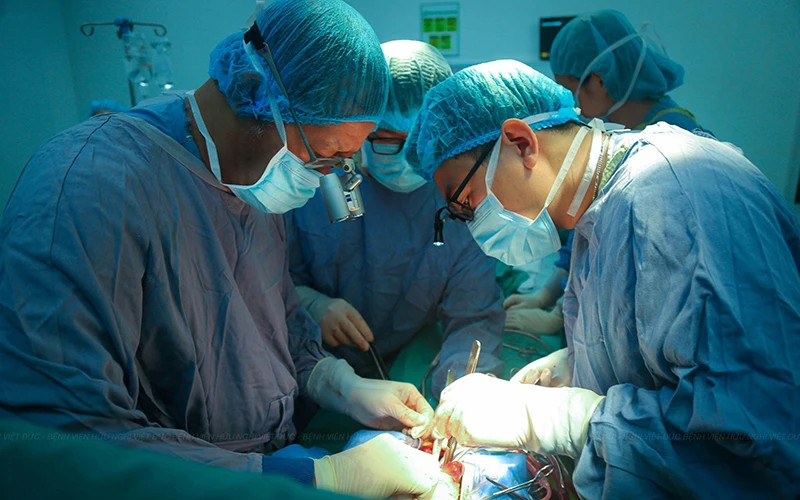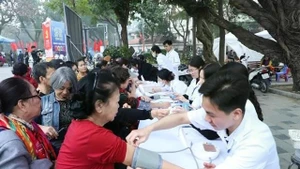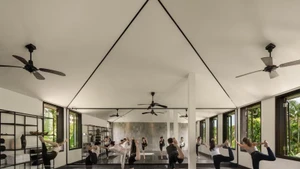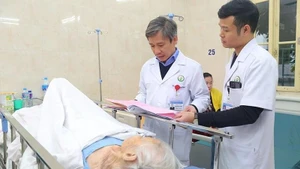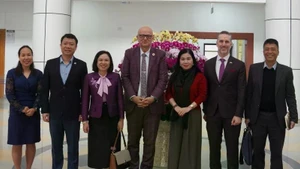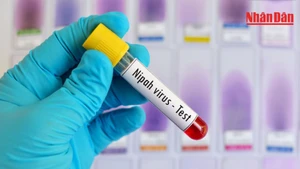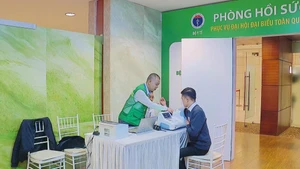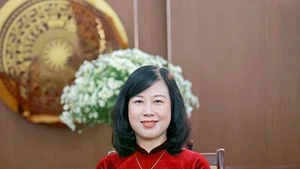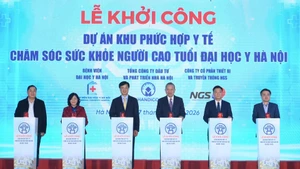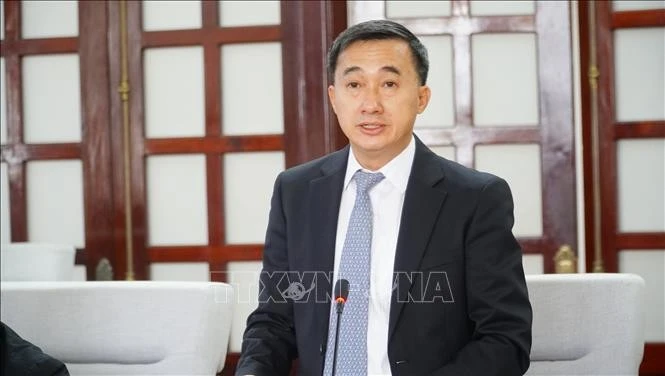Saving a patient with life counted by days
D.V.H (41 years old, from Thanh Hoa Province) had suffered from dilated cardiomyopathy for a long time. Despite receiving medical treatment, his condition worsened, leading to liver, kidney, and other organ failures. At the end of September 2024, he was admitted to Viet Duc Friendship Hospital due to decompensated heart failure (unresponsive to conventional treatment), acute progressive liver failure, and kidney failure. Tests showed the patient had severe coagulation disorders, and his life was only being sustained by extracorporeal membrane oxygenation (ECMO) to replace heart function and continuous liver filtration to replace liver function. His remaining days were numbered. The only method to save his life was an organ transplant.
At that critical moment, a "fortunate coincidence" occurred when Viet Duc Friendship Hospital received information from Nghe An General Friendship Hospital about a brain-dead patient whose family wished to donate organs. Upon receiving the news, Viet Duc Friendship Hospital sent a specialised team to support the patient's resuscitation, assess brain death, and evaluate the condition of the organs for possible transplantation. By noon on October 1, 2024, after confirming the brain death and the viability of the organs for transplant, the medical team was divided into two groups. One group stayed behind to assist Nghe An General Hospital in performing two kidney transplants, while the second group quickly transported the heart and liver to Hanoi for immediate transplantation for the patient.
Even having secured the organs, deciding how to proceed with the transplant was a real battle of nerves. During consultations, leading specialists in resuscitation, cardiology, hepatology, and nephrology were divided over the extremely difficult case. The transplant required careful consideration of all possible scenarios since the patient’s heart, liver, and kidneys were all in critical stages of failure. Some opinions suggested not performing the transplant due to the low chance of success; if the transplant failed, it would waste two organs, meaning two other patients would lose the opportunity to have life-saving transplants.
However, in the face of the patient's life or death situation, despite the slim odds, the doctors pressed on with the highest determination. The hospital's scientific council decided to proceed with the transplant. Assoc. Prof. Dr. Nguyen Tien Quyet, former Director of Viet Duc Friendship Hospital and a leading expert in liver transplantation, shared: "We had to discuss thoroughly before deciding to perform the transplant. If successful, one patient's life would be saved, and if not, the doctors would gain invaluable lessons for future transplants.”
Each team involved in the transplant faced significant pressure. The surgical team endured eight continuous hours of intense focus, while the anaesthesia and resuscitation team only felt some relief when the patient’s chances of survival gradually improved, eventually reaching 80%. Assoc. Prof. Dr. Luu Quang Thuy, Director of the Anaesthesia-Resuscitation Centre, said that although organ transplants have become routine procedures, this was the first simultaneous heart-liver transplant on a critically ill patient, making anaesthesia and resuscitation extremely risky and stressful.
Thanks to the smooth coordination between experienced leading specialists, the transplant was completed successfully. Eight hours after the surgery, the heart started beating again in its new body; the liver began producing bile, and the patient's blood coagulation levels and liver enzymes gradually returned to normal. Thirty-six hours after the transplant, the heart and liver functions continued to recover, and the patient was moved to intensive care for special monitoring. Nearly 10 days of post-surgery, both heart and liver showed an 80% chance of survival, with the remaining 20% depending on infection control and the patient's physical recovery.
A testament to the skill of Vietnamese doctors
Dr. Duong Duc Hung, Director of Viet Duc Friendship Hospital, confirmed that this was the first time in the history of Vietnamese medicine that doctors successfully performed a simultaneous heart-liver transplant on a critically ill patient. To date, few countries have been able to achieve this procedure, and the number of such emergency transplants worldwide is low, mainly limited to countries with advanced medical systems and strong economic conditions.
Notably, most multi-organ transplants globally are performed as planned operations, where the patient’s condition is stable, and preparations are meticulous. However, this case was an emergency with the patient in extremely poor health, and both heart and liver function had nearly ceased. Therefore, the success of this operation demonstrates the full mastery of transplant techniques by Vietnamese doctors, including the most complex and challenging cases.
During her visit to congratulate the patient and the medical team at Viet Duc Friendship Hospital, Minister of Health Dao Hong Lan affirmed that the success of this transplant further underscores the high level of expertise and technical proficiency of Vietnamese doctors, particularly at Viet Duc Friendship Hospital — one of the country's leading institutions. The Minister shared that during international trips, when discussing Vietnam's achievements in organ transplantation, international colleagues expressed surprise and admiration. She expressed her hope that Viet Duc Hospital will continue to advance high-level medical techniques, providing patients with increasingly better healthcare services.
Dr. Duong Duc Hung also shared that the successful completion of this transplant reflects the excellent coordination between Viet Duc Friendship Hospital, as the top-tier hospital, and its satellite hospitals in the transfer of medical techniques, particularly in supporting lower-level hospitals to develop expertise in organ retrieval and transplantation.
This was not the first time that Viet Duc Friendship Hospital has supported lower-tier hospitals in organ resuscitation, retrieval, and local transplantation (having previously supported hospitals like Saint Paul General Hospital, Phu Tho General Hospital, and Thanh Hoa Provincial General Hospital). The success of this simultaneous dual-organ transplant provides valuable experience in the collaboration among various medical teams (anaesthesia, transplantation, resuscitation), which will help the hospital to better prepare for the implementation of other organ transplants in the future.
